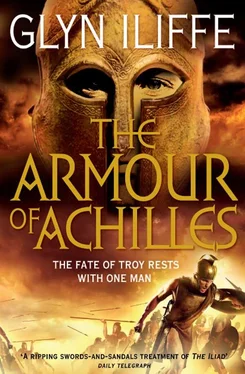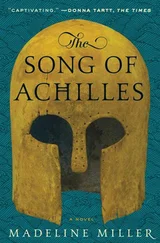Glyn Iliffe - The Armour of Achilles
Здесь есть возможность читать онлайн «Glyn Iliffe - The Armour of Achilles» весь текст электронной книги совершенно бесплатно (целиком полную версию без сокращений). В некоторых случаях можно слушать аудио, скачать через торрент в формате fb2 и присутствует краткое содержание. Год выпуска: 0101, ISBN: 0101, Издательство: Pan Books, Жанр: Старинная литература, на английском языке. Описание произведения, (предисловие) а так же отзывы посетителей доступны на портале библиотеки ЛибКат.
- Название:The Armour of Achilles
- Автор:
- Издательство:Pan Books
- Жанр:
- Год:0101
- ISBN:9781447205098
- Рейтинг книги:4 / 5. Голосов: 1
-
Избранное:Добавить в избранное
- Отзывы:
-
Ваша оценка:
- 80
- 1
- 2
- 3
- 4
- 5
The Armour of Achilles: краткое содержание, описание и аннотация
Предлагаем к чтению аннотацию, описание, краткое содержание или предисловие (зависит от того, что написал сам автор книги «The Armour of Achilles»). Если вы не нашли необходимую информацию о книге — напишите в комментариях, мы постараемся отыскать её.
The Armour of Achilles — читать онлайн бесплатно полную книгу (весь текст) целиком
Ниже представлен текст книги, разбитый по страницам. Система сохранения места последней прочитанной страницы, позволяет с удобством читать онлайн бесплатно книгу «The Armour of Achilles», без необходимости каждый раз заново искать на чём Вы остановились. Поставьте закладку, и сможете в любой момент перейти на страницу, на которой закончили чтение.
Интервал:
Закладка:
Eperitus pushed his sword point into the man’s throat then glared at the remaining Lycians, who looked on in shock at the defeat of their champion. From every part of the wall now there came the sound of bronze beating against bronze, the calls and cries of men and the strange shuffling of leather sandals on stone as crowds of warriors fought desperately to kill each other. Then, as Eperitus raised his shield and readied his sword to attack, an arrow split the air past his right ear and stuck in the throat of a Lycian spearman, who gasped horribly as he struggled to gain control of his dying body.
‘Even you can’t take them all alone,’ said a familiar voice.
Eperitus turned to see the scruffy figure of Antiphus at his shoulder, with the bulk of Polites looming up behind him. A moment later Odysseus joined them, his face spattered with blood and his sword running with gore.
‘I knew you couldn’t stay out of things for long,’ the king said, his earlier rebuke seemingly forgotten. ‘It’s not in your nature.’
Then he raised his shield before him and ran at the Lycians, shouting his defiance. Eperitus and the others followed, sweeping all resistance before them until the will of the defenders cracked and many began to drop their weapons in surrender. The remainder fled back down the steps that led to the city streets, closely followed by streams of Greeks. As Eperitus joined the pursuit he caught sight of a fresh body of enemy spearmen and archers, standing in ordered ranks at the far end of a broad, heavily rutted street that led to the heart of the city. At the head of this unbloodied reserve were Sarpedon and Aeneas, their armour bright in the sunshine as they ordered the stragglers from the walls to join the solid lines of their comrades. Then, just as Eperitus was thinking that the battle for Lyrnessus was far from over, a great crash from the southernmost point of the city signalled the fall of the gates to Achilles and his Myrmidons. Soon the whole of Lyrnessus would be filled with Greeks. Realizing there was no hope of defending the city, Sarpedon and Aeneas suddenly began ordering their soldiers to fall back to the northern gate.
Eperitus jumped down on to the dusty, body-strewn street, closely followed by Odysseus.
‘They’ve given up,’ the king said, watching the hasty but well-ordered retreat. ‘Form the men into lines, quickly – I want to catch them while they’re still inside the city. If they get out on to the open plain most of them will escape back to Troy.’
Eperitus looked at Odysseus, whose stern eyes were determined to kill as many of the enemy as possible, and shook his head.
‘I can’t.’
Odysseus shot him a questioning look. ‘Can’t?’
‘I saw my father on the walls. He’s here, somewhere in the city. I have to find him.’
‘Apheidas is here! Are you sure?’
Eperitus nodded and Odysseus raised his eyebrows.
‘Then I’ll come with you. Diomedes and Achilles can lead the pursuit, and Antiphus can command the Ithacans . . .’
‘No, Odysseus,’ Eperitus replied. ‘Sarpedon and Aeneas will fight a hard rearguard and the men will need you to lead them. Besides, I have to face Apheidas by myself. You understand that.’
‘Of course,’ Odysseus answered. He gripped Eperitus’s shoulder and looked him in the eye. ‘Go and do what you have to, and may Athena protect you.’
With that, he turned and looked up at the walls, where Diomedes was giving orders for the captives to be properly treated.
‘Come on, you old war dog! Leave the prisoners to the guards; there’s still plenty of fighting to be had down here.’
‘And I’ll be in the thick of it before you are, you red-headed laggard,’ Diomedes shouted back.
Eperitus left them and ran after the fleeing Lycians and Dardanians, hoping for a glimpse of his father. The force under Sarpedon and Aeneas had already disappeared from sight, but here and there lone soldiers were still running from the walls, desperate to escape death or capture at the hands of the victorious Greeks. Ahead of him was a stumbling figure, covered in blood and clutching at the stump of his arm. Eperitus caught up with him and grabbed his shoulder.
‘Where’s Apheidas?’ he demanded.
The man stared at him blankly, his brown face pale from shock and loss of blood. Eperitus shoved him aside and ran on to where a young soldier, barely more than a boy, was cowering in a doorway. He shrieked as Eperitus sprinted up to him, sword still in hand, and could only shake his head in terror as the same question was pressed on him.
Cursing, Eperitus left him and ran on down the street, his heart beating fast with the fear that his father would escape. He had waited too long to face him and despite his earlier doubt he was now filled with an urgent need to confront Apheidas. He reached a turn in the street and saw a small market square ahead of him. The tail of the enemy rearguard was marching across it, heading towards the gate in the northern wall of the city. An archer recognized his old-fashioned but unmistakeably Greek shield and called to his comrades, who loosed a dozen hasty arrows towards him. They were hopelessly out of range, though, and the nearest bounced harmlessly off the wall beside his head.
Unfazed, Eperitus scanned the retreating army for sight of his father, but knew in his heart that he was not among them. Seeing a narrow side road, he dashed down it as more arrows sailed down to stick into the earth around his running feet.
Soon he was losing himself among the dark, deserted alleyways of Lyrnessus, hoping beyond hope that he would stumble across Apheidas among the shadows. But every door was closed and the windows he passed revealed only empty rooms, devoid of all removable possessions. The city’s population had abandoned their homes in a hurry, fearful of the slaughter, rape and enslavement that a triumphant Greek army would bring. Even the dogs had gone, leaving the streets and marketplaces temporarily bereft of the signs of civilized life.
But the void they had left was already being filled. Here and there Eperitus saw the stooping, misshapen figures of wounded men, fleeing the destruction at the gates and on the battlements and desperately seeking a place to hide from the wrath of the victors. Eperitus ignored them, knowing they would be too confused or frightened to be of any use in his hunt for his father. His sharp senses picked up the harsh shouts of warriors drawing in on every side, closely followed by the crackle of flames and the smell of burning. He emerged on to another broad avenue – which he guessed must run from the southern gate – and saw a dozen black-clad men to his right.
‘There’s one,’ a voice shouted.
A spear flew fast and accurate towards Eperitus’s head. He leaned to his left and flung up his shield, knocking the missile aside with the flat of the layered oxhide.
‘Hold, damn you,’ he shouted, as the battle-crazed Myrmidons readied their weapons to attack. ‘I’m Eperitus, captain of the Ithacan royal guard.’
‘Impossible! Achilles was first in the city, and we were right beside him as the gates fell. The Ithacans are still trying to take the walls.’
Eperitus gave a derisive laugh. ‘Odysseus and I were inside the city while you were still knocking on the doors. And if you still doubt who I am, then I know two of you at least are from Peisandros’s command. What Trojan would know that? Now get about your business and leave me to mine.’
He ran on, leaving the confused Myrmidons staring after him. He passed more groups of Achilles’s men and several bodies as he went. As the sky began to fill with dark palls of smoke he heard the heavy clash of weapons ringing in the distance. The fight with the enemy’s rearguard had begun, but whether Odysseus and Diomedes were leading the attack, or whether Achilles had caught up with them first, Eperitus could not guess. Then, as he reached an open space before a squat temple of yellow stone, a man stepped out from a doorway and lunged at him with a sword. Eperitus turned aside at the last moment, just as the blade passed beneath his arm and scraped against his cuirass. The sharpened upper edge slid along the soft skin beneath his bicep, burning like hot iron as it opened his flesh. Wincing with pain, he stepped away and threw his shield across his body as his assailant drew his arm back for a second thrust. The point jabbed at the oxhide, but was too weak to penetrate. Eperitus responded with a foot to the man’s groin, doubling him over. Before he could bring his sword down into the man’s skull, a second appeared from the same doorway and took the blow on the boss of his oval shield. A third man followed and suddenly Eperitus found himself facing three fully armed Lycians, with no inclination to retreat until they had taken their revenge on at least one Greek.
Читать дальшеИнтервал:
Закладка:
Похожие книги на «The Armour of Achilles»
Представляем Вашему вниманию похожие книги на «The Armour of Achilles» списком для выбора. Мы отобрали схожую по названию и смыслу литературу в надежде предоставить читателям больше вариантов отыскать новые, интересные, ещё непрочитанные произведения.
Обсуждение, отзывы о книге «The Armour of Achilles» и просто собственные мнения читателей. Оставьте ваши комментарии, напишите, что Вы думаете о произведении, его смысле или главных героях. Укажите что конкретно понравилось, а что нет, и почему Вы так считаете.












